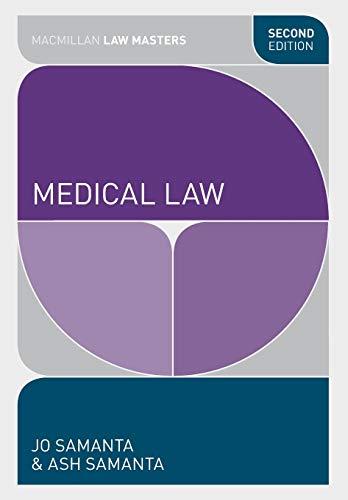Question
Please share your thoughts about the following paragraph. Agree or Disagree why or why not Howe, A. (2022, May 31). Divided court blocks Texas from
Please share your thoughts about the following paragraph. Agree or Disagree why or why not
Howe, A. (2022, May 31). Divided court blocks Texas from enforcing social media law. SCOTUSblog. Retrieved June 5, 2022, from https://www.scotusblog.com/2022/05/divided-court-blocks-texas-from-enforcing-social-media-law/(Links to an external site.)
This article discusses the U.S. Supreme Court's recent decision to block a Texas law which would have prohibited "social media platforms with at least 50 million active users from blocking, removing, or "demonetizing" content based on the users' views" (par. 4). The Court was highly divided on the decision to block the law, with a 5-4 final vote. This case is especially relevant to the topics we have discussed in this class so far, as it deals with states rights and constitutional law.
The first aspect that I found interesting about this case that is relevant to this class is the role of states in regulating the business dealings of national and international companies. In this case in particular, it seems that it would be very difficult for a company like Facebook or Twitter to abide by this law in Texas only but not in the other states in which the company operates in. In other words, if a social media company cannot remove a post from a Texan that includes dangerous language or misinformation, other states would suffer as a consequence of a law passed in a state other than their own. To me, this seems like a situation in which the state's actions should be curtailed, as they are impeding on other states' rights.
The bigger question in this case, however, is the issue of a First Amendment violation. The technology trade groups who brought this case to the Supreme Court argued that the Texas law violates social media companies from exercising their First Amendment rights by disallowing them to regulate what is posted on their websites. In contrast, the Texas Attorney General argued that he didn't feel the law regulated free speech, but even if the Court found that it did, "the state can still regulate the platforms because they are 'common carriers' - a legal term for businesses that transport people, goods, or services and cannot pick and choose among their customers" (par. 7).
In the final decision and the dissent, the justices refrained from providing any real decision on the merits of the case, and instead argued that either the law should not go into effect until litigation in the lower courts is completed or that the law should have gone into effect until the social media companies can "show that, under existing law, they are likely to prevail on the merits of their challenge" (par. 9). In my personal opinion, I think that the law should be struck down on the basis that state laws cannot impede other states' rights and that the law itself impedes the social media companies' ability to regulate what is on their websites. After all, there are other social media platforms that exist in which these individuals can post their views on.
Step by Step Solution
There are 3 Steps involved in it
Step: 1

Get Instant Access to Expert-Tailored Solutions
See step-by-step solutions with expert insights and AI powered tools for academic success
Step: 2

Step: 3

Ace Your Homework with AI
Get the answers you need in no time with our AI-driven, step-by-step assistance
Get Started


